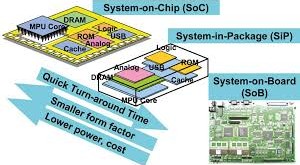Introduction: Recent research published in the journal Radio Science and Technology has unveiled a groundbreaking achievement in radar technology by Chinese naval scientists. Led by scientist Song Jie from the PLA Naval Aviation University, the team has developed a novel method for analyzing radar signals emitted by other countries’ military …
Read More »Unveiling the Krasukha Electronic Warfare system: Russia’s Shield Against Airborne and Satellite Threats
Introduction: In an era marked by escalating tensions and evolving warfare techniques, the role of electronic warfare (EW) systems has become increasingly critical. Among these cutting-edge systems stands the Krasukha Electronic Warfare System, a formidable defense against both airborne and satellite threats. Developed by Concern Radio-Electronic Technologies (KRET), a subsidiary …
Read More »Pioneering the Final Frontier: Advancements in Space Microelectronics Propel Future Missions
Introduction: In the realm of space exploration, the race to unlock the mysteries of the universe and expand humanity’s reach beyond Earth’s bounds is accelerating. With NASA’s ambitious plan to send humans to Mars by 2033 and China’s announcement of a manned moon base, the stakes have never been higher. Meanwhile, …
Read More »Exploring Graphene: The Future of Semiconductor Technology
Introduction: In the realm of material science, graphene has emerged as a revolutionary substance, offering unparalleled properties that promise to reshape the landscape of semiconductor technology. As a single sheet of carbon atoms arranged in a hexagonal lattice, graphene possesses remarkable strength, flexibility, and conductivity. In this article, we delve …
Read More »Unlocking the Potential of Direct RF FPGAs: A Game-Changer in Wireless Communication
The wireless communication landscape has experienced significant advancements in recent years, enabling us to stay connected like never before. Behind these advancements lies the groundbreaking technology of Direct RF FPGAs, which has revolutionized the design and implementation of wireless systems. In this article, we will explore the key features and …
Read More »Silent Sentinels: The Rise of Passive Radars for Air and Maritime Defense
In the realm of defense and surveillance, the evolution of radar technology has been a silent yet transformative journey. Traditional radar systems, with their colocated transmitters and receivers, have long been the stalwarts of air defense and maritime surveillance. However, a new contender has emerged on the horizon – passive …
Read More »Capacitors: The Backbone of Modern Electronics – Exploring Technologies and Market Trends
Introduction: In the vast realm of modern electronics, capacitors are often regarded as the unsung heroes that silently enable the seamless operation of various electronic devices and systems. From smartphones and IoT devices to renewable energy systems and aerospace applications, capacitors serve as the backbone, providing vital functions and shaping …
Read More »DEFEND: Revolutionizing Front-Line Defense with Microwave Directed Energy Weapons Technology (DEW)
Introduction: In an era defined by technological innovation and geopolitical uncertainty, the need for advanced defense systems has never been more critical. One area of growing interest is directed energy weapons, which utilize concentrated beams of energy to disable or destroy targets. The US military’s Directed Energy Front-Line Electromagnetic Neutralization …
Read More »Advancing Dominance: U.S. Air Force Doctrine on Electromagnetic Spectrum Operations
Introduction: In the ever-evolving landscape of modern warfare, the U.S. Air Force stands poised at the forefront, armed not only with cutting-edge technology but also with strategic doctrine designed to seize and maintain dominance across all domains. With the release of its latest doctrine on Electromagnetic Spectrum (EMS) Operations on …
Read More »Advancing Aviation: The Rise of More Electric Aircraft (MEA) and All Electric Aircraft technologies
In recent years, the aviation industry has been undergoing a significant transformation driven by technological advancements and a growing emphasis on sustainability. One of the most promising developments in this regard is the emergence of More Electric Aircraft (MEA) and All Electric Aircraft (AEA). These innovative aircraft designs leverage new …
Read More » International Defense Security & Technology Your trusted Source for News, Research and Analysis
International Defense Security & Technology Your trusted Source for News, Research and Analysis



